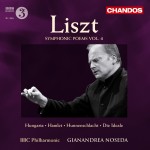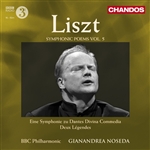FRANZ LISZT
(1811-1886)
Symphonic Poem No. 9
1.
Largo con duolo - Quasi andante marziale -
8:19
2.
Agitato (un poco più mosso) -
3:41
3.
Agitato molto - Più mosso (ma poco) -
2:50
4.
Largo con duolo - Andante. Tempo di marcia funebre -
3:25
5.
Allegro marziale -
1:45
6.
Allegro trionfante - Stretto - Presto giocoso assai
1:59
Symphonic Poem No. 10
7.
Sehr langsam und düster -
3:32
8.
Allegro appassionato ed agitato assai -
2:26
9.
Allegro (wie früher) - Allegro molto agitato -
3:28
10.
Sehr langsam und düster (wie Anfangs) -
4:21
Hunnenschlacht, S 105
15:08
Symphonic Poem No. 11
11.
Tempestoso. Allegro non troppo -
2:21
12.
Das Tempo bleibt immer dasselbe bei dem verschiedenen Taktwechsel -
4:07
13.
Maestoso assai (Andante) - Lento -
5:20
14.
Allegro (alla breve) - Stretto
3:19
Symphonic Poem No. 12
15.
'So willst du treulos von mir scheiden'. Andante -
1:38
16.
Aufschwung. 'Es dehnte mit allmächt'gem Streben'. Allegro spiritoso (alla breve) -
5:47
17.
'Da lebre mir den Baum, die Rose'. Quieto e sostenuto assai -
2:55
18.
'Wie einst mir flehendem Verlangen'. [Quieto e sostenuto assai] -
2:28
19.
'Wie tanzte vor des Lebens Wagen'. [Allegro molto mosso] -
3:12
20.
Enttäuschung. 'Doch, ach! schon auf des Weges Mitte'. Andante -
2:48
21.
'Von all dem rauschenden Geleite'. Das Tempo allmählich etwas bewegter -
0:50
22.
'Du, die du alle Wunden heilest'. {das Tempo allmählich etwas bewegter] -
2:35
23.
Beschäftigung. 'Und du, die gern sich mir ihr gattet'. [Andante mestoso] -
2:16
24.
Aposteose. Più moderato, maestoso, con somma passione -
4:15
Orchestra: BBC Philharmonic Orchestra
Conductor: Gianandrea Noseda
















 My Wish List
My Wish List








